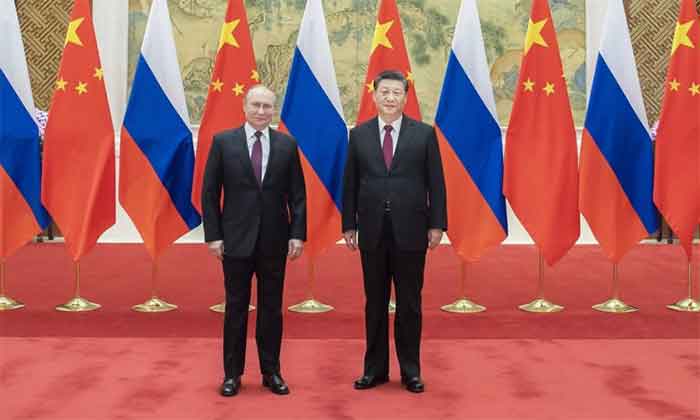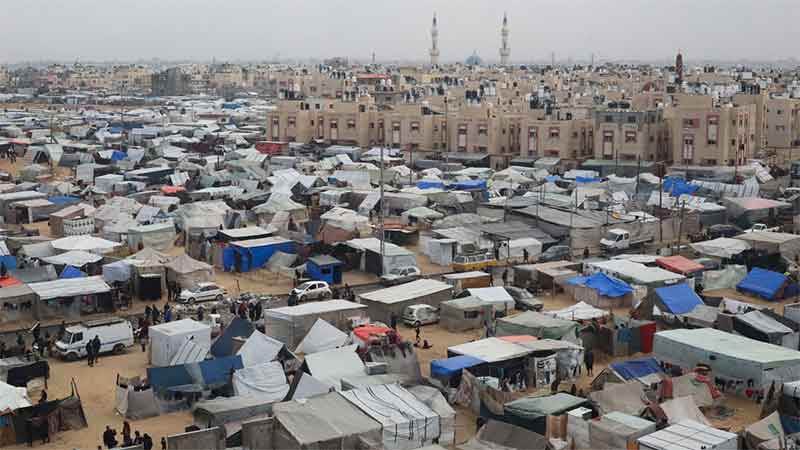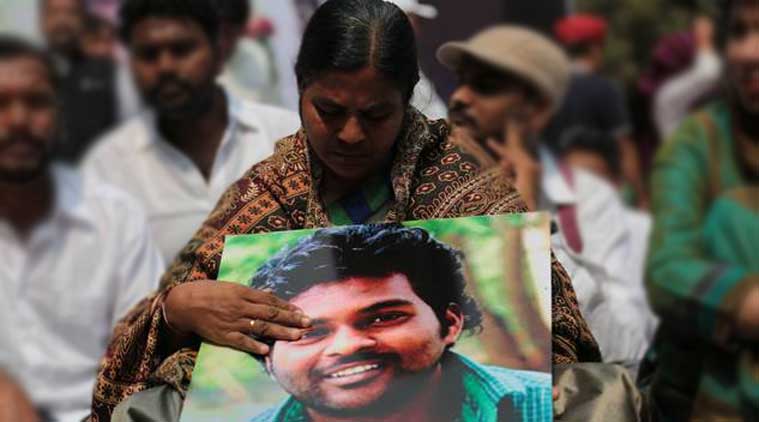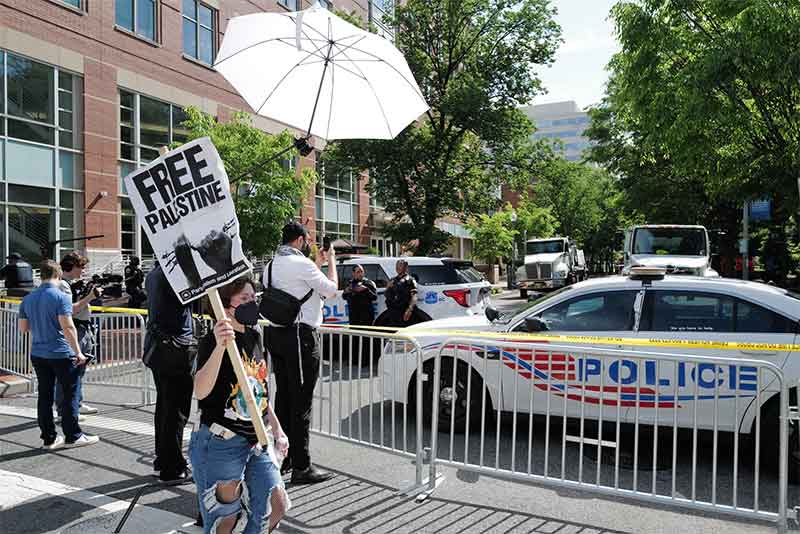
U.S. Secretary of State Antony Blinken said Thursday the Biden administration aims to lead the international bloc opposed to Russia’s invasion of Ukraine into a broader coalition to counter what it sees as a more serious, long-term threat to global order from China.
Media reports including a report by AP from Washington DC said:
In a speech outlining the administration’s China policy, Blinken laid out a three-pillar approach to competing with Beijing in a race to define the 21st century’s economic and military balance.
While the U.S. sees Russia and Russian President Vladimir Putin’s war in Ukraine as the most acute and immediate threat to international stability, Blinken said the administration believes China poses a greater danger.
“Even as President Putin’s war continues, we will remain focused on the most serious long-term challenge to the international order — and that is the one posed by the People’s Republic of China,” Blinken said.
“China is the only country with both the intent to reshape the international order — and, increasingly, the economic, diplomatic, military, and technological power to do it,” he said. “Beijing’s vision would move us away from the universal values that have sustained so much of the world’s progress over the past 75 years.”
Thus, Blinken laid out principles for the administration to marshal its resources, friends and allies to push back on increasing Chinese assertiveness around the world. Although he made clear that the U.S. does not seek to change China’s political system, rather it wants to offer a tested alternative.
“This is not about forcing countries to choose, it is about giving them a choice,” he said.
U.S. Has Limited Ability
However, he also acknowledged that the U.S. has limited ability to directly influence China’s intentions and ambitions and will instead focus on shaping the strategic environment around China.
“We cannot rely on Beijing to change its trajectory,” Blinken said in the speech, delivered at George Washington University. “So we will shape the strategic environment around Beijing to advance our vision for an open and inclusive international system.”
Blinken’s address was delivered overnight in China, and there was no immediate reaction to the speech from the Chinese embassy in Washington.
The speech followed President Joe Biden’s just-concluded visits to South Korea and Japan, where China loomed large in discussions. Biden raised eyebrows during that trip when he said that the United States would act militarily to help Taiwan defend itself in the event of an invasion by China, which regards the island as a renegade province.
The administration scrambled to insist that Biden was not changing American policy, and Blinken restated that the U.S. has not changed its position. Blinken said Washington still holds to its “One China” policy, which recognizes Beijing but allows for unofficial links with and arms sales to Taipei.
“Our approach has been consistent across decades and administrations. The United States remains committed to our ‘One China’ policy. We oppose any unilateral changes to the status quo from either side,” he said, adding that “we do not support Taiwan independence.”
Blinken said that while U.S. policy on Taiwan has remained consistent, China’s had become increasingly belligerent.
He made the case that the global response to Putin’s invasion of Ukraine can serve as a template for dealing with China’s efforts to mold a new and unpredictable world order to replace the rules and institutions that have guided relations between states since the end of World War II.
China, Blinken said, has benefited greatly from that international order but is now trying to subvert it under the leadership of President Xi Jinping and the Chinese Communist Party.
“Rather than using its power to reinforce and revitalize the laws, agreements, principles, and institutions that enabled its success, so other countries can benefit from them, too, Beijing is undermining it,” Blinken said. “Under President Xi, the ruling Chinese Communist Party has become more repressive at home and more aggressive abroad.”
Yet, Blinken also decried the rise in anti-Chinese and anti-Asian hate crimes in the U.S., saying Chinese Americans and other Asian Americans have the same claim to the U.S. as any other immigrants or their descendants.
Investment in domestic U.S. infrastructure and technology along with stepping up diplomatic outreach to potentially vulnerable countries are other elements of the policy and are key to the U.S. approach, Blinken said.
Wang Yi’s Eight-nation Tour Of Pacific Islands
In the latest manifestation of China’s push to expand its reach that has drawn concern from the U.S. and other democracies, Chinese Foreign Minister Wang Yi on Thursday began an eight-nation tour of Pacific islands during which Beijing hopes to strike a sweeping agreement that covers everything from security to fisheries.
Wang opened his tour in the Solomon Islands, which last month signed a security cooperation pact with China that some fear could lead to a Chinese military presence there. The agreement was finalized shortly after the Biden administration announced it would open a U.S. embassy in the Solomons as part of its efforts to engage in the greater Indo-Pacific region.
Australian Foreign Minister Penny Wong was expected to fly to Fiji on Thursday, a day after returning to Sydney from Japan as the new government hastens to counter Chinese influence in the South Pacific, The Australian newspaper reported. Wong’s office did not immediately respond to a request for confirmation.
The Biden administration has largely kept in place confrontational policies toward China adopted by its predecessor in response to Chinese actions in its western Xinjiang region, Hong Kong, Tibet and the South China Sea.
While the U.S. sees areas for working with Beijing, such as combatting climate change, it will not trade cooperation for compromising on its principles regarding human rights and rule of law, Blinken said.
Putin’s ‘Thunderbolt’ Spells End Of Globalization, Scholz Warns
Other media reports said:
Olaf Scholz, the German Chancellor, has warned that the era of globalization that powered the German economic miracle is “coming to an inevitable end” after Vladimir Putin’s “thunderbolt”.
Scholz referenced the book “The Magic Mountain.” In the work, the protagonist is awakened from a seven-year stay at a Swiss sanatorium to the thunderbolt of World War I.
“Ladies and gentlemen, we, too, have experienced a thunderbolt,” Scholz said.
The German Chancellor admitted that Europe’s largest economy, Germany, faces a “very special challenge” as the industrial powerhouse is hit by soaring energy prices.
Scholz launched a defense of globalization at the World Economic Forum (WEF) in Davos but admitted that its era is drawing to a close as inflation rises.
He said: “We are experiencing a watershed; history is at a turning point.”
Germany’s huge manufacturing base has benefited from an interconnected world and cheap energy from Russia. However, the war in Ukraine and trade chaos caused by Covid has forced governments and businesses to rethink supply chains and energy security.
Scholz, the only G7 leader to speak at Davos this year, said that Europe had been struck by a “thunderbolt” from the war in Ukraine and a new “multipolar world” is emerging.
He said: “The special phase of globalization we have experienced in North America and Europe during the last 30 years, with reliable growth, a high level of added value and low inflation is coming to an inevitable end.
Global South’s Aspiration
“One reason for this is that the low cost producers of the global south are gradually becoming thriving economies with their own demand, which aspire to the same level of prosperity as we have.
He admitted that globalization had created losers and said it needs to become more “intelligent”.
Scholz said the scramble to bolster energy security “will have an impact on Europe’s economies”.
Special Challenge
“We are feeling it, not least through rising energy prices and of course, this presents a very special challenge to a country like Germany, which is an industrialized nation.”
Big Contraction Of German Economy Feared
Germany is one of countries most reliant on Russia energy imports and has refused to back a gas embargo to put the squeeze on the Kremlin. German households and factories are being hit by the surge in energy prices and the Bundesbank has warned of a big contraction if the Russia gas supply is turned off.
“We cannot allow Putin to win his war, and I firmly believe that he will not win it,” Scholz said.
“He has failed to meet any of his strategic goals. Russia capturing all of Ukraine seems less likely now than it did at the start of the war, thanks not least to the remarkable defensive actions fought by the Ukrainian army and the European population.”
He added that Russia’s invasion is not “some little conflict,” because Putin is aiming to return to a world order dictated by strength.
“The world is indeed at a turning point,” Scholz said. “And it is not only the state of Ukraine that is at stake. It is the system of international cooperation that was designed in the aftermath of two devastating world wars.”
“That is an attempt to blast us back to a time when war was a common instrument of politics, when our continent and the world were without a stable, peaceful order,” he added.
But Scholz noted that Putin had failed in his “strategic goals” to take the former Soviet country, with Russia’s invasion now stretching on for more than three months without a notable victory.
Ukraine pushed Russian forces back from the capital of Kyiv and has fought ferociously in the eastern Donbas region after Russia regrouped last month for a renewed offensive.
“To my mind, if one thing is clear, it is that Putin will only seriously negotiate a peace when he realizes that he cannot break Ukraine’s defenses,” Scholz said.
“About-face” On Germany’s Defense Policy
Scholz called recent German commitments to send weapons to Ukraine an “about-face” on the country’s defense policy and pointed to plans to create a €100 billion fund — about $107 billion — to modernize the German military.
Scholz said the advancements would ensure Germany is able to defend itself “under the new conditions” of Russia’s invasion.
“We cannot allow Putin to win his war, and I firmly believe that he will not win it,” he said.
Putin Predicts Failure Of The West
Western nations that are trying to punish others with economic sanctions are overestimating their strength, Russian President Vladimir Putin said during the Eurasian Economic Forum (EuEF) on Thursday.
No ‘World Policeman’ Can Halt
“More and more countries in the world want and will pursue independent policy,” he said at the international event. “No ‘world policeman’ can halt this natural global process. No one is that strong.”
“They face challenges inside their nations, and I hope they realize that this policy has absolutely no prospects,” the Russian leader said, referring to the U.S. and its Western allies.
Russia became the world’s most sanctioned nation after the West retaliated against it for the war in Ukraine. The restrictions were touted by officials as a way to inflict a cost on Russia and destabilize its economy to coerce Moscow into a retreat. However, many nations refused to join the sanctions drive, including NATO member Turkey.
Global markets, which were already under pressure due to the Covid-19 pandemic and the disruption of supply chains, have been further destabilized by the stand-off. Many Western nations have experienced levels of inflation unseen in decades as energy and food prices have surged on the uncertainty.
The event, EuEF, where Putin made the remarks was organized by the Eurasian Economic Union (EuEU), a regional economic integration organization comprising Armenia, Belarus, Kazakhstan, Kyrgyzstan, and Russia as members.
No Intention Of Shuttering The World Economy
In his opening speech, the Russian leader explained how his country had no intention of shuttering its economy to the rest of the world. He also reported how Russia was dealing with the sanctions, including by replacing crucial imported products with domestically-produced replacements.
Asia Is Gaining Strategic And Economic Importance, Says Thai Leader
An AP report from Tokyo said:
Thai Prime Minister Prayuth Chan-ocha said Thursday that a new U.S.-backed economic pact is further proof of how important and relevant Asia is today.
“Asia is still expanding and gaining more influence in terms of strategic and economic importance,” Prayuth said.
U.S. President Joe Biden and Japanese Prime Minister Fumio Kishida announced earlier this week during a visit by Biden to Japan that 13 countries have joined the Indo-Pacific Economic Framework (IPEF), a new trade pact that will help the U.S. work more closely with Asian economies on issues including supply chains, digital trade, clean energy and anticorruption efforts.
The signatories are Australia, Brunei, India, Indonesia, Japan, Malaysia, New Zealand, the Philippines, Singapore, South Korea, Thailand, the United States and Vietnam. Together they represent 40% of the world’s GDP.
Prayuth is in Tokyo to attend the “The Future of Asia” organized by Nikkei Inc.
He stressed the need to increase economic growth by keeping markets open and inclusive as the world faces disruptions such as the coronavirus pandemic and Russia’s invasion of Ukraine.
“Sustainable economic growth is only possible when we are able to adopt to any disruption,” Prayuth said.
Thailand is the host of next year’s Asia-Pacific Economic Cooperation forum summit. Prayuth said APEC is at a critical juncture, with a need to achieve peace and drive economic growth.
Australia’s Government Urges China To Remove Trade Barriers
Another AP report from Canberra said:
Australia’s new government has urged China to lift trade sanctions if it wants to reset a bilateral relationship that plumbed new depths under the previous administration.
The Chinese premier’s congratulatory letter to Prime Minister Anthony Albanese on his election victory was widely seen as a relaxation of Beijing’s two-year ban on high-level government contact with Australia. Premier Li Keqiang said China was ready to work with Australia to development the bilateral relationship.
But Albanese said it was China, not Australia that had changed since his center-left Labor Party was last in power in 2013.
China has created a series of official and unofficial trade barriers in recent years to a range of Australian exports worth billions of dollars including coal, wine, barley, beef and seafood.
“It is China that has placed sanctions on Australia,” Albanese told reporters Tuesday at a Tokyo summit that he attended with President Joe Biden, Japanese Prime Minister Fumio Kishida and Indian Prime Minister Narendra Modi.
“There is no justification for doing that and that’s why they should be removed,” Albanese added.
Treasurer Jim Chalmers also called for China to immediately lift trade barriers between the free-trade partners.
During a National Press Club speech last week, Albanese blamed Morrison for damaging relationships with other countries.
Submarine Controversy
He said Morrison misled the U.S. that Labor supported a secret plan to provide Australia with a fleet of submarines powered with U.S. nuclear technology. In fact, Albanese’s party was not told of the plan until the day before it was announced in September.
Albanese also accused Morrison of leaking to the media personal text messages from Emmanuel Macron to discredit the French president’s complaint that Australia had given no warning that a French submarine contract would be canceled. Macron also accused Morrison of lying to him, and French Ambassador Jean-Pierre Thebault described the leak as a warning to other world leaders that the Australian government could weaponize their private communications.
Voices Related to Energy In Germany
Veronika Grimm, one of the German government’s chief economic experts that advise the chancellery said: “If he resigns from his offices in Russian companies, that won’t change much. The dependence on Russian gas remains.”
Grimm now advocates a change in tack but suspects that many in Germany oppose such a shift.
“While no one dares say it, there is, reading between the lines, in some circles, a hope that relations can go back to normal with Russia.”
Despite the announcements on sanctions and promises of arms deliveries, much of which have yet to materialize, Germany’s relationship with Russia has changed little since the war in Ukraine, at least where gas flows are concerned.
Russian gas supplies to Germany have been largely uninterrupted since the outbreak of war.
Long-term gas supply contracts are being honored, on the grounds that cutting them would trigger an economic meltdown.
Uniper, Germany’s largest importer of Russian gas, last week said its existing gas contracts with Gazprom would run until the middle of the next decade, at odds with Germany’s Green party economy minister Robert Habeck, who is seeking to end reliance by mid-2024.
Uniper Chief Executive Klaus-Dieter Maubach went as far as describing Gazprom as a reliable supplier, contradicting Habeck, who has said the opposite about Russia.
Big German industry names, including chemicals giant BASF, underline the importance of Russian gas.
“Russia supplies around 50% of the natural gas consumed in Germany. Russian gas shipments therefore underpin the competitiveness of our industry,” BASF CEO Martin Brudermueller said last month.
“If the natural gas supply from Russia were to suddenly stop, it would cause irreversible economic damage.”
Others in industry, too, see Habeck’s timeline for when ties can be cut skeptically.
Markus Krebber, the CEO of RWE, Germany’s largest power producer and importer of Russian gas, said early-2025, rather than 2024, was more realistic to cut ties.
Until then, Germany’s gas lobby hopes to maintain the status quo.
Sempra Strikes LNG Supply Deal With Germany’s Largest Power Producer
A Reuters report said:
U.S.-based Sempra Energy said on Wednesday it would sell about 2.25 million tonnes per annum (Mtpa) of liquefied natural gas (LNG) to Germany’s largest power producer, RWE AG, which is trying to wean itself off Russian gas.
U.S. LNG companies have been exporting record volumes to the European Union following sanctions on Russia, which tightened supplies to an already under-supplied market.
RWE’s commodity exposure to Russia includes 15 terawatt hours (TWh) of gas deliveries by 2023, which it has reduced to 4 TWh since the invasion.
“Sempra Infrastructure’s LNG projects are uniquely positioned to help provide U.S. LNG to support the energy security of U.S. allies in Europe, while also accelerating the transition to a lower carbon future,” the company said in a statement.
Sempra said it would supply the gas for 15 years from its Port Arthur LNG Phase 1 project being developed in Jefferson County, Texas.
Earlier this month, the company clinched a deal to supply three million tonnes of LNG each year to Poland’s PGNiG.
White House Promises ‘Holistic Review’ of China Tariffs
The White House finally has a meeting on the books to determine how to handle Trump-era tariffs on Chinese goods that have remained unchanged since Biden’s inauguration.
During a press conference Monday in Tokyo, U.S. President Joe Biden told reporters that he will meet with Treasury Secretary Janet Yellen when he returns to the U.S and that tariff reductions are a possibility.
“I am considering it,” Biden said of lowering the duties. “We did not impose any of those tariffs. They were imposed by the last administration, and they are under consideration.”
During a recent Yahoo Finance live interview, Biden adviser Bharat Ramamurti gave a bit more insight on the issues that White House officials will examine when reconsidering the tariffs.
“We are in the midst of [a] holistic review,” said Ramamurti, deputy director of the National Economic Council. “The impacts of tariffs on prices and inflation is one factor but tariffs can serve other purposes as well for national security, for industrial policy, and domestic development.”
The meeting may finally help resolve a long simmering debate since Biden’s inauguration. Yellen recently confirmed that she favors eliminating at least some tariffs, saying they “aren’t very strategic” and could hurt U.S. consumers and businesses.
The White House may zero in on tariffs on consumer goods like clothing, which Trump imposed as part of its ongoing trade war with China — eliminating those duties could save Americans money right away.
A main administration figure on the other side reportedly is U.S. Trade Representative Katherine Tai, who is pushing to hold off on making immediate reductions as other issues between the two issues are ironed out.
‘We Bring To That Competition A Number Of Strengths’
It will be a complicated decision for Biden and his aides. Cutting the tariffs could ease inflation but would also deliver a win to the Chinese economy. The average tariff across all Chinese goods — on things ranging from solar panels to steel to shoes — sits at 6%.
The Peterson Institute for International Economics recently determined that dropping that number to 4% would save roughly $800 per U.S. household thanks to a one-time reduction of 1.3 percentage points off the consumer price index.
But the move would also come as China has failed to live up to its side of the recent trade deal. The “phase one” trade deal that then-President Trump signed in January 2020 stipulated that the U.S. would remove tariffs if China sharply increased its purchases of U.S. goods.
But China has not held up its end of the bargain. One recent estimate says China has purchased just 57% of what it promised overall in the trade deal and none of the additional $200 billion in imports it pledged.
Biden has loosened many of Trump’s trade restrictions on other places, especially Europe, but the levies on China have stayed so far to provide leverage on other issues from China’s contribution to global warming to its relationship with Russia.
In the end, close observers will anxiously await which tariffs stay and which ones go as part of the larger confrontation between the two nations.
“We bring to that competition a number of strengths, and we are building on those strengths with the president’s leadership,” Ramamurti says.









































